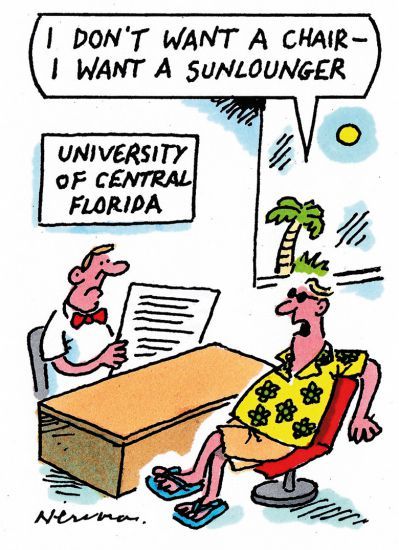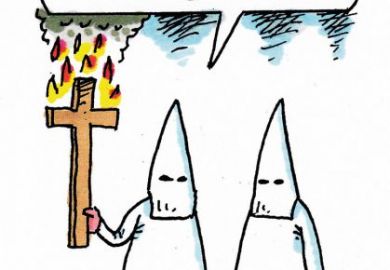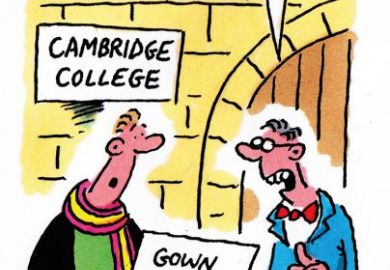
Staff at the University of Glasgow fear “riots” if right-wing provocateur Milo Yiannopoulos visits the institution as he bids to become its next rector, The National reported on 6 March. The former Breitbart editor, who resigned from his job after he said that sexual relationships between young teenage boys and adults could be consensual, is among 12 people who have been nominated for the largely ceremonial role. Writing on Facebook, Mr Yiannopoulos said: “Tip for Glasgow students: literally nothing will annoy your professors more than this.” A senior academic quoted by The National said that institutional leaders were fearing a visit. “There’ll be riots,” he said. “The last thing we want is for the university to go up in flames just because some students have got drunk and nominated this racist, sexist, homophobic bully for what is actually an important position.”
A professor previously tipped to become US ambassador to the European Union has faced tough questions after he was accused of embellishing his CV. Ted Malloch, professor of strategic leadership and governance at Henley Business School, was billed as Donald Trump’s likely nominee until the Financial Times identified misleading statements, including the claims that he was “knighted” into the Sovereign Order of St John by the Queen and was called a “genius” by Margaret Thatcher. While apparently unfazed by what he called a “political assassination”, Professor Malloch chose an unusual media outlet to fight back – InfoWars, an online talk show hosted by widely derided conspiracy theorist Alex Jones. Things predictably reached new levels of strangeness in the 1 March interview when the presenter asked how Professor Malloch intended to “bring down the EU”, which he described as a “eugenics” project led by “globalists”, designed to “cut off resources, enslave the people, while they live like kings”. However, as Mr Trump is a self-confessed fan of InfoWars, Professor Malloch’s appearance on the show might not have been a bad move if he was able to sway one influential viewer.
A US senator behind a bill to achieve greater political balance in universities’ workforces is also facing credibility issues around his CV, NBC News reported on 1 March. Mark Chelgren, who is pushing a controversial bill that aims for greater balance among Democrats and Republicans in Iowa’s higher education institutions, claimed that he had gained a “business degree” from “Forbco Management School”, an institution located near Los Angeles. However, NBC found that the alleged alma mater is actually a company that operated a Sizzler steakhouse franchise in southern California and that Mr Chelgren did not have a degree. “This was not an attempt to inflate anything,” Mr Chelgren told NBC News, adding that he had not been aware of the error on his website until a reporter asked about it – an excuse known in the UK as the “Paul Nuttall defence”.
There is a new must-have feature in the amenities arms race between US universities: a “lazy river”. The public University of Central Florida has plans to construct a “resort-style” lazy river – a water ride that allows people to drift along on rafts – as part of a $25 million (£20.3 million) construction project to be funded by donations that will also include an athletics village, a mini-golf course and a beach volleyball court, the Daily Mail reported on 2 March. Texas Tech University, the University of Missouri, Louisiana State University and the University of Akron already have lazy rivers, apparently. Hopefully the students get a chance to enjoy them, particularly those emphatically non-lazy ones working long hours to finance their studies as tuition fees continue to soar across the US.
“Academia’s lurch to the left raises concerns for campus free speech,” roared The Times on 2 March. The article was based on a report from the Adam Smith Institute that claimed that “evidence suggests the overrepresentation of left-liberal views may have increased since the 1960s”. Times Higher Education was flattered to see its self-selecting online opinion survey of 1,000 UK university staff prior to the 2015 general election used as the report’s sole evidence for current political leanings in academia. But it blushed to see the figures conflated with those gathered by A. H. Halsey on the political leanings of academics in the 1960s, 1970s and 1980s to provide the sole evidence for the claim of growing leftward bias. “It is important to be aware that Halsey sampled his respondents differently to the THE, and posed a slightly different question, which means the comparison over time should be treated with a certain amount of caution,” the report observes sagely. In other words, the evidence base is wobblier than a blancmange factory.
Register to continue
Why register?
- Registration is free and only takes a moment
- Once registered, you can read 3 articles a month
- Sign up for our newsletter
Subscribe
Or subscribe for unlimited access to:
- Unlimited access to news, views, insights & reviews
- Digital editions
- Digital access to THE’s university and college rankings analysis
Already registered or a current subscriber?




